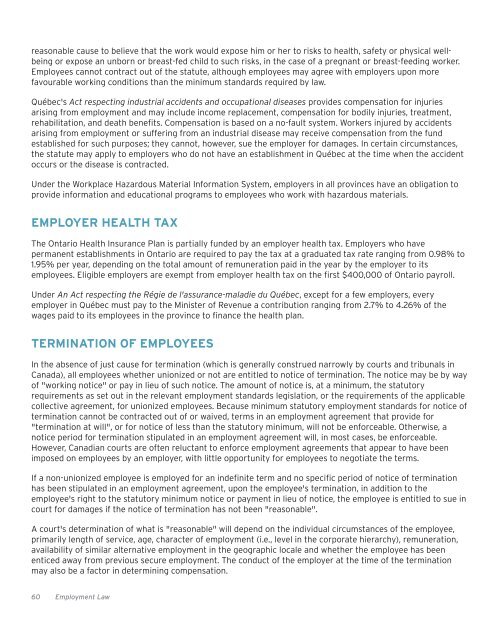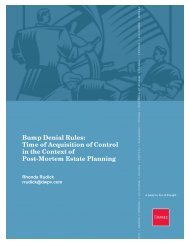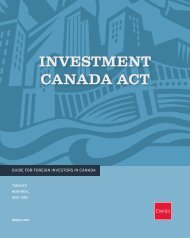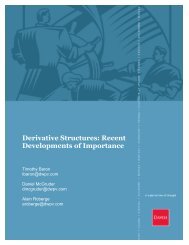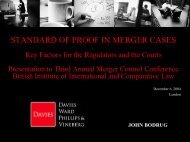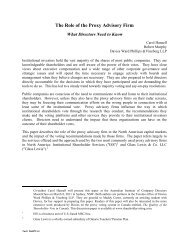doing business in canada - Davies Ward Phillips & Vineberg LLP
doing business in canada - Davies Ward Phillips & Vineberg LLP
doing business in canada - Davies Ward Phillips & Vineberg LLP
- No tags were found...
You also want an ePaper? Increase the reach of your titles
YUMPU automatically turns print PDFs into web optimized ePapers that Google loves.
easonable cause to believe that the work would expose him or her to risks to health, safety or physical wellbe<strong>in</strong>gor expose an unborn or breast-fed child to such risks, <strong>in</strong> the case of a pregnant or breast-feed<strong>in</strong>g worker.Employees cannot contract out of the statute, although employees may agree with employers upon morefavourable work<strong>in</strong>g conditions than the m<strong>in</strong>imum standards required by law.Québec's Act respect<strong>in</strong>g <strong>in</strong>dustrial accidents and occupational diseases provides compensation for <strong>in</strong>juriesaris<strong>in</strong>g from employment and may <strong>in</strong>clude <strong>in</strong>come replacement, compensation for bodily <strong>in</strong>juries, treatment,rehabilitation, and death benefits. Compensation is based on a no-fault system. Workers <strong>in</strong>jured by accidentsaris<strong>in</strong>g from employment or suffer<strong>in</strong>g from an <strong>in</strong>dustrial disease may receive compensation from the fundestablished for such purposes; they cannot, however, sue the employer for damages. In certa<strong>in</strong> circumstances,the statute may apply to employers who do not have an establishment <strong>in</strong> Québec at the time when the accidentoccurs or the disease is contracted.Under the Workplace Hazardous Material Information System, employers <strong>in</strong> all prov<strong>in</strong>ces have an obligation toprovide <strong>in</strong>formation and educational programs to employees who work with hazardous materials.EMPLOYER HEALTH TAXThe Ontario Health Insurance Plan is partially funded by an employer health tax. Employers who havepermanent establishments <strong>in</strong> Ontario are required to pay the tax at a graduated tax rate rang<strong>in</strong>g from 0.98% to1.95% per year, depend<strong>in</strong>g on the total amount of remuneration paid <strong>in</strong> the year by the employer to itsemployees. Eligible employers are exempt from employer health tax on the first $400,000 of Ontario payroll.Under An Act respect<strong>in</strong>g the Régie de l'assurance-maladie du Québec, except for a few employers, everyemployer <strong>in</strong> Québec must pay to the M<strong>in</strong>ister of Revenue a contribution rang<strong>in</strong>g from 2.7% to 4.26% of thewages paid to its employees <strong>in</strong> the prov<strong>in</strong>ce to f<strong>in</strong>ance the health plan.TERMINATION OF EMPLOYEESIn the absence of just cause for term<strong>in</strong>ation (which is generally construed narrowly by courts and tribunals <strong>in</strong>Canada), all employees whether unionized or not are entitled to notice of term<strong>in</strong>ation. The notice may be by wayof "work<strong>in</strong>g notice" or pay <strong>in</strong> lieu of such notice. The amount of notice is, at a m<strong>in</strong>imum, the statutoryrequirements as set out <strong>in</strong> the relevant employment standards legislation, or the requirements of the applicablecollective agreement, for unionized employees. Because m<strong>in</strong>imum statutory employment standards for notice ofterm<strong>in</strong>ation cannot be contracted out of or waived, terms <strong>in</strong> an employment agreement that provide for"term<strong>in</strong>ation at will", or for notice of less than the statutory m<strong>in</strong>imum, will not be enforceable. Otherwise, anotice period for term<strong>in</strong>ation stipulated <strong>in</strong> an employment agreement will, <strong>in</strong> most cases, be enforceable.However, Canadian courts are often reluctant to enforce employment agreements that appear to have beenimposed on employees by an employer, with little opportunity for employees to negotiate the terms.If a non-unionized employee is employed for an <strong>in</strong>def<strong>in</strong>ite term and no specific period of notice of term<strong>in</strong>ationhas been stipulated <strong>in</strong> an employment agreement, upon the employee's term<strong>in</strong>ation, <strong>in</strong> addition to theemployee's right to the statutory m<strong>in</strong>imum notice or payment <strong>in</strong> lieu of notice, the employee is entitled to sue <strong>in</strong>court for damages if the notice of term<strong>in</strong>ation has not been "reasonable".A court's determ<strong>in</strong>ation of what is "reasonable" will depend on the <strong>in</strong>dividual circumstances of the employee,primarily length of service, age, character of employment (i.e., level <strong>in</strong> the corporate hierarchy), remuneration,availability of similar alternative employment <strong>in</strong> the geographic locale and whether the employee has beenenticed away from previous secure employment. The conduct of the employer at the time of the term<strong>in</strong>ationmay also be a factor <strong>in</strong> determ<strong>in</strong><strong>in</strong>g compensation.60 Employment Law


